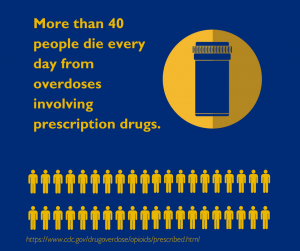Epidemic. We typically associate this word with infectious disease outbreaks, often outside of the United States. But right here in the U.S., we are in the middle of a unique epidemic: an opioid epidemic. Opioids have long been used for the treatment of short-term pain, and more recently for long-term pain. But rising rates of opioid prescriptions have also been accompanied by an increase in the rate of drug overdose deaths, causing concern in the medical community about the safety of continuing to use these drugs.
What Makes Opioid Addiction So Difficult To Treat?
The use of opioids to treat pain began as many as 5,000 years ago, when ancient Sumerians grew poppy plants, which contain opium. Opioids work by binding to opioid receptors on nerve cells; the resulting conformational change in the opioid receptor stops pain messages from traveling to the brain. Unfortunately, opioids can bind to any nerve cell with an opioid receptor, regardless of the cell’s location, leading to negative and potentially life-threatening side effects. Breathing and heart rate are both controlled by nerve cells in the brain stem, for example, and when these cells are bound by opioids, their function is drastically depressed.
Other key concerns surrounding opioids are their addictive power and the propensity to develop tolerance. In addition to blocking pain, opioids stimulate the release of dopamine, causing a feeling of pleasure; this draws individuals to want to experience it more, causing addiction. Tolerance develops as the opioid receptors in the brain become less responsive to stimulation. As a result, higher doses of the opioid are required to achieve the same pain-killing effect, causing some patients to remain on the drug long after their initial pain subsides.
W eaning a patient off opioids is not a simple process either. As a patient takes opioids over time, their nervous system makes key changes to overcome the suppression of respiration, blood pressure and activity caused by the drug. When the opioid is removed, these changes are still in place, leading to overactivity of the system. The withdrawal symptoms of jitters, anxiety, muscle cramps and diarrhea present a major challenge to ending a patient’s dependence on the drug.
eaning a patient off opioids is not a simple process either. As a patient takes opioids over time, their nervous system makes key changes to overcome the suppression of respiration, blood pressure and activity caused by the drug. When the opioid is removed, these changes are still in place, leading to overactivity of the system. The withdrawal symptoms of jitters, anxiety, muscle cramps and diarrhea present a major challenge to ending a patient’s dependence on the drug.
Two Approaches to Opioid Addiction Research At Johns Hopkins
Addiction, dependence and the potentially life-threatening side effects make the opioid epidemic a difficult one to treat. The Johns Hopkins Hospital has a Behavioral Pharmacology Research Unit (BPRU), where researchers are working to develop ways to combat opioid addiction and dependence. The BPRU is able to directly test the effects of drugs on human volunteers in a laboratory setting, allowing for tightly controlled studies. The goal is to find a way to help people wean themselves off opioids without experiencing debilitating withdrawal symptoms. Dr. Eric Strain of the BPRU works with buprenorphine, an opioid used for detoxification from strong pain-killing opioids, which helps negate withdrawal symptoms. Work to optimize use of this drug primarily happens at Johns Hopkins. Through his research with buprenorphine, Dr. Strain has improved the way physicians can care for patients facing opioid addiction.
Other researchers have taken another approach, choosing to focus on identifying new compounds to treat pain in a more targeted way as a means to eliminate the need for opioids. Johns Hopkins features a Pain Research Core made up of physicians and basic science researchers who work together to identify new ways to treat and manage pain. Dr. Srinivasa Raja, a principal investigator and member of the Pain Research Core, recently received a large R01 grant from the National Institutes of Health to fund his exploration of pain mechanisms. Dr. Raja’s lab focuses on understanding the roles of the opioid and adrenergic receptors in neuropathic pain. His work helps identify targets for drug treatment that are in the peripheral nervous system instead of in the brain, which would alleviate many of the negative symptoms of opioids and make the drugs less likely to be addictive.
Since the introduction of opioid pain killers, over 100,000 people have died in the United States from using these drugs. As the opioid epidemic becomes more nationally recognized, more research and funding are being dedicated to the problem. As with any other disease, new treatment options will be found to change the lives of those affected by this opioid epidemic, and Johns Hopkins will continue to play a key role in the fight.
Related Content
- Curbing the Tide of the Opioid Epidemic
- Listen to the Podcast: Why aren’t more doctors using buprenorphine to help people overcome opiates?
- A Medical Model to Treat Opioid Addiction—and Link Care

My brother has been in withdrawal treatment for 2 years now. He became addicted after suffering from back surgery then getting merca infection on Spine. He spent 2 months in wound intensive care unit having his spine opened from top to bottom. He came home in wheelchair learning to walk again. After all of this he now lives with me having to deal with pain every day for this last year. He goes to pain clinic and takes Suboxin for withdrawals. He still has to use catheter and has bowel problems. There's no relief for chronic pain in intestinal area suffering night and day. He's not had any opioids in these past 2 years. I'm wondering if this medication you're using could help him. Maybe something could suggest to his doctor. Thank you for this information.
And as a chronic pain sufferer, the only thing I can get as treatment for my severe degenerative disc disease and scoliosis is a back brace. Physical tberspy, over and over, aqua therapy, over and over, exercise, daily. Because of this epidemic, I just have to deal with a lot of pain and sleepless nights. Thank you. Thank you very much.
I've been suffering chronic back pain for close to 2 years now and reading this article is extremely relatable. Opioid addiction is not something to be taken lightly, always check with your doctor about dosage and managing intake, thanks for sharing.
Comments are closed.